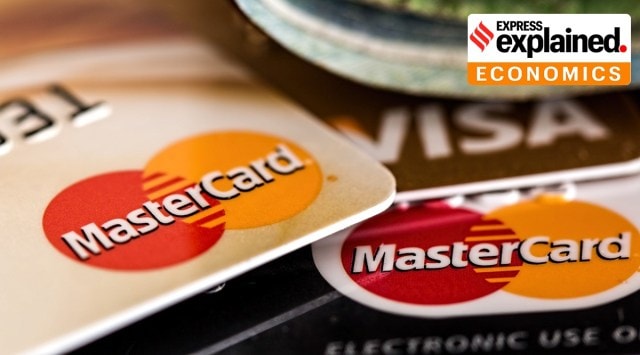Credit card usage: Why RBI wants banks to let customers choose among Visa, Mastercard, other card networks
Banks usually issue credit cards to customers in association with card networks. If a customer has a credit card issued by the bank with its logo and the Visa logo on it, the bank is the credit card issuer and Visa is the credit card network.
 According to RBI data, credit card outstanding has soared to Rs 2 lakh crore, a rise of 29.7 per cent on a year-on-year basis. (Photo via Steve Buissinne/Pixabay)
According to RBI data, credit card outstanding has soared to Rs 2 lakh crore, a rise of 29.7 per cent on a year-on-year basis. (Photo via Steve Buissinne/Pixabay) Should it be Visa, Mastercard, American Express or RuPay? At a time when the credit card business of banks is booming, the Reserve Bank of India (RBI) wants credit card issuers (banks and finance companies) to allow customers opt for their desired card network instead of forcing them to accept the favourite networks of banks.
What does the proposal entail?
The central bank has proposed that card issuers provide an option to their eligible customers to choose any one among the multiple card networks. This option may be exercised by customers either at the time of issue or at any subsequent time, the RBI said in a draft circular to banks.
The RBI has said card issuers should not enter into any arrangement or agreement with card networks that restrain them from availing the services of other card networks. “Card issuers should issue cards across more than one card network,” the central bank said, stating that card issuers and card networks should ensure to adhere to these requirements in existing agreements at the time of amendment or renewal and fresh agreements executed from the date of the RBI circular.
What do card networks do?
Credit card networks provide the centralised communication system that card issuers like banks and non-banks use to process credit card transactions. The networks and issuers authorise and process credit card transactions, set the transaction terms, and move payments between customers, businesses, and their banks. Major credit card networks include Visa, Mastercard, American Express and RuPay.
Banks usually issue credit cards to customers in association with card networks. If a customer has a credit card issued by the bank with its logo and the Visa logo on it, the bank is the credit card issuer and Visa is the credit card network.
When a customer uses a credit card to make a purchase, the transaction request goes to the credit card issuer, who then decides whether or not to authorise it through the network system of the card networks. The bank extends credit to the cardholder, and the cardholder pays the bank back for purchases made with the credit card.
What are the practices that RBI want to put an end?
Many banks have exclusively tied up – informally – with card networks to offer their services whether the customers prefer them or not. While one of India’s leading two private banks have tied up with Visa, the other one offers only the network of MasterCard.
“It is observed that arrangements existing between card networks and card issuers (banks and non-banks) are not conducive to the availability of choice for customers,” the RBI said. Some banks have been forcefully asking customers to accept particular card networks.
The RBI had indefinitely barred Mastercard, American Express and Diners Club from issuing new debit, credit or prepaid cards to customers over noncompliance with local data storage rules two years ago but lifted the ban later.
How is the credit card market doing?
According to RBI data, credit card outstanding has soared to Rs 2 lakh crore, a rise of 29.7 per cent on a year-on-year basis. Banks have issued 8.65 crore credit cards, as of April 2023. Monthly credit payments are now over Rs one lakh crore every month, with card payments touching Rs 1.32 lakh crore in the month of April 2023.
The surge in credit card usage in India is a positive indicator of the growing purchasing power of our country. “The outstanding debt of over Rs 2 lakh crore underscores the power of credit cards in enabling individuals to fulfil their needs and wants,” said Meet Semlani, Co-founder, Tartan. However, it is crucial to establish the right awareness to ensure credit cards are issued with the right practice by credit card companies, Semlani said.
Vivek Iyer, Partner and leader, Financial services risk, Grant Thornton Bharat, said spending has been high in contact-intensive sectors such as travel, hospitality, and tourism, where historically credit card has been the preferred mode of payment, given the large ticket size of payments. “Additionally, non-discretionary spending is also being routed through credit cards primarily due to the innovative reward structure followed by various banks,” he said.
- 01
- 02
- 03
- 04
- 05






































